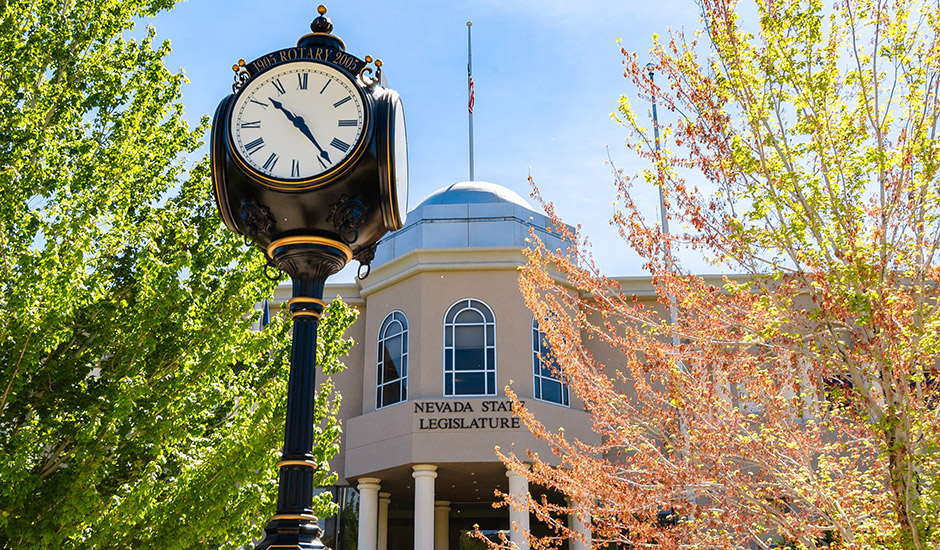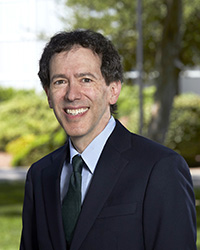Let’s Get Practical
Health Law course gives students the opportunity to assist state legislators with shaping important health-related policy


By Lisa Jacob
While it’s not uncommon for students to tackle contemporary issues in the classroom, the health law legislation course at the UNLV William S. Boyd School of Law takes the classroom to the community, empowering students to have real-world impact on Nevada’s critical social matters.
The course is designed to teach students about the legislative process in general. However, instead of a traditional final exam or research paper, students in Dr. David Orentlicher’s class collaborate with state lawmakers to research and draft bills for introduction to the Nevada Legislature.
“One of our goals of the Health Law Program, as part of a state university and the only law school in the state, is for us to serve as a resource for policy makers and bring our expertise to important questions that our legislators are dealing with,” says Orentlicher, who developed the health law education course when he arrived at Boyd Law School in 2017. “Giving students a chance to apply what they learned about health care law and policy with hands-on, real-world experience and to do it with legislative drafting, that’s unusual.”
Given Orentlicher’s unique background in health (he’s a medical doctor) and the legislative process (he served in the Indiana House of Representatives from 2002-08), the course was a natural addition to his instructional lineup at Boyd Law School, alongside bioethics and constitutional law. He modeled it after speaking with a professor at Georgia State University College of Law in Atlanta who taught something similar. “The one big difference is the students at Georgia State are not allowed to work with the legislators, so they work with advocacy groups instead,” he says. “For us to be able to work directly with the legislators is very helpful.”
Orentlicher divided his Spring 2020 class into groups of three who prepared bills on four topics regarding the accessibility and costs of health care coverage, and protecting victims of sexual assault. A legislator typically determines the topics, but students may influence or modify those choices.
One unsuccessful bill from the 2019 session that students revived is AB227. Introduced by Assemblywoman Connie Munk, the bill modifies language in Nevada’s sexual assault laws to further define consent and increase protections to victims.
“Assemblywoman Munk wants to bring it back in the 2021 session, so the students worked with her to address the concerns that were raised in 2019 and refine the bill,” Orentlicher says. “Other legislators may have a general concern, such as prescription drug costs or health care costs. The students and I work with the legislators to narrow down [those concerns]. Sometimes the students in their research can expand the topic and may say, ‘In addition to that approach we can add elements to broaden our approach to the problem.’”
Another group worked alongside Assemblywoman Robin L. Titus on a bill to lower health care costs by requiring insurers, hospitals, and physicians to provide patients with information about the costs of care so they can compare prices when choosing health care providers.
A third group helped build on a bill Assemblywoman Melissa Hardy successfully sponsored into law in 2019 that provides more transparency in prescription drug pricing. The legislation protects vulnerable populations, especially senior citizens.
“That’s what she wanted to focus on—seniors and transparency—but was open to other ideas in terms of what we could do to lower prescription drug costs,” says 3L Boyd Law School student Celssie Hardy, who is Hardy’s daughter.
Celssie Hardy’s group researched ways to bolster the positive effects of the new law, comparing similar initiatives in other states, attending committee meetings, and documenting prices of the most-prescribed drugs. The group drafted a bill for negotiations between drug companies and the Medicaid program to lower prescription costs for Nevadans on Medicaid.
“I’m a very hands-on learner, so when I saw the opportunity to actually create and draft legislation that could potentially be sponsored by a legislator, I took it,” Celssie Hardy says. “Doing so enhances your educational experience because you are actually getting to do the groundwork. It gives you a different perspective; you can be more involved in the process and put what you are learning into practice.”
Gillian Block, a 3L at Boyd Law, says she was drawn to the Health Law class because she wanted to learn more about the legislative process as well as “the nuts and bolts of writing bills.”
“It was interesting and very practical,” says Block, who will participate in the legislative process next year as part of an externship for a nonprofit organization. She also might testify about another bill she and her classmates in a fourth group helped write in Orentlicher’s class. The group worked with Assemblywoman Michelle Gorelow to on a bill to improve access to prenatal care by expanding the state’s policy on presumptive eligibility for Medicaid coverage during pregnancy.
It’s an issue Block feels strongly about, especially in light of widespread unemployment caused by the COVID-19 pandemic.
“Now more than ever, with COVID-19 and with the economic situation, being able to help more women access prenatal care and have positive birth outcomes would be incredibly meaningful,” says Block, who worked on health care issues for U.S. Senator Catherine Cortez Masto’s office in Reno. “To help [Gorelow’s] idea come to fruition would be absolutely amazing.”
Through the class, Block said she gained a lot of valuable knowledge pertaining to the legislative process. “We learned about lobbying in the most granular way, [such as] how to address committee members, what the rules are in Nevada for how a committee is run, and some best practices for making a presentation if you’re going to go before a legislator and try to pass a bill.”
Block and her fellow Boyd Law students will have to wait until the Nevada Legislature convenes in 2021 to see if their work passes the ultimate test. However, one thing is known: Their professor will have a front-row seat in Carson City as a freshman member of the Nevada State Assembly. That’s because Orentlicher won the Democratic primary for Assembly District 20 in June and faced no opposition for the seat in the November general election.